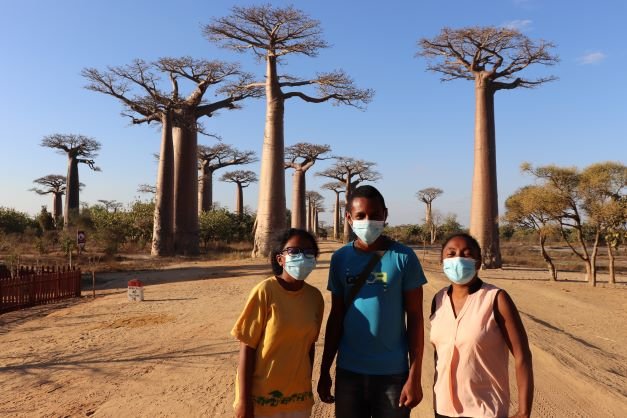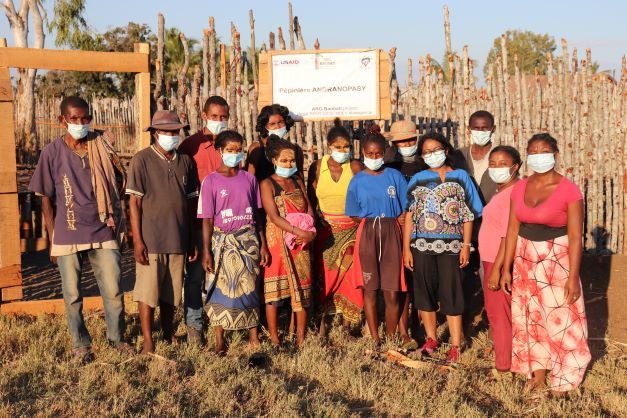Cycle 9 (2020 Deadline)
Improving human livelihoods through holistic conservation of Malagasy orphaned plants, the iconic Baobab trees
PI: Seheno Andriantsaralaza (s.andriantsaralaza@gmail.com), University of Antananarivo
U.S. Partner: Onja Razafindratsima, University of California, Berkeley
Project Dates: April 2021 - January 2024
Project Overview
In the past, many long-lived plant species relied on large-bodied terrestrial animals (megafauna) to disperse their seeds. Unfortunately, many megafaunal communities are now extinct due to anthropogenic activities, leaving these plants “orphaned.” Madagascar is facing an alarming extinction crisis, including the loss of large-bodied animal seed dispersers, due partially to poaching and illegal trades. However, almost all targeted conservation efforts in Madagascar rarely consider restoring the missing ecological functions within ecosystems. Understanding such disruptions is essential to reduce the risk of extinction of plant species and resolve biodiversity conservation issues.
This PEER project sought to examine the mechanisms ensuring the persistence and regeneration of Malagasy baobab trees (Adansonia grandidieri Baillon), an economically valuable, orphaned, and endangered plant species, to advance solutions to promote its sustainable use to benefit local communities. The researchers aimed to characterize the factors allowing baobab’s persistence in the absence of its animal partners, evaluate the role of extant native and non-native animals in compensating for the functional loss of their primary dispersers, and provide conservation-targeted solutions that consider local livelihoods, especially considering threats to the rich biodiversity of Madagascar include widespread poverty, especially among the populations that rely heavily on natural resources.
Final Summary of Project Activities
The project's field sites were located in two areas of the Menabe region in western Madagascar: Andranomena village to the north of Morondava and Andranopasy village to the south. Extensive fieldwork was conducted during the baobab fruiting season, where researchers, in collaboration with the Ary Saina association, collected data on the fields. The team’s research elucidated the orphaned status of baobab trees and the role of secondary dispersers in baobab seed dispersal. A manuscript on these findings was in process at the time of the final project report in the spring of 2024. The project facilitated capacity building among research team members, fostering skill development and promoting scientific expertise within the local context. The PI visited the U.S. partner’s lab to further enhance research skills, and the U.S. partner visited a field site in January 2023, gaining insights into the research activities and providing additional training to the students.
Beyond their research efforts, the PEER team transplanted 21,058 seedlings with the help of local community groups—9,033 in Andranomena and 12,223 in Andranopasy. This joint effort not only helped to restore the Baobab habitats but also instilled a sense of responsibility and ownership among the community groups towards the conservation of the Baobab trees. Additionally, the researchers conducted follow-up assessments every three months on the transplanted seedlings, revealing a survival rate of 63%. The team worked closely with the local community groups, VOI AMI and VOI MITI, to create a fire break in the Andranopasy site as a proactive measure to protect the area against the potential risks of natural and human-caused fires.
A PEER team member also undertook a pilot study on fruit production and trade dynamics, providing valuable insights into the economic aspects of baobab conservation. Ferme Aina, a company located in Andranopasy, has expressed its interest in purchasing baobab fruits from the local communities. The project is acting as a mediator between the two parties, intending to ensure that the fruit is not overexploited. The team proposed a quota system to regulate the harvesting of the fruits, while also ensuring that the local communities benefit from the sale of baobab fruits. Once the quota is formalized by CITES and the scientific authority, they can establish a partnership with the local communities.
The researchers organized a three-day workshop to provide stakeholders with a platform for discussing policy implications based on the findings of the project, as well as a closeout event in January 2024, where they discussed project findings with the USAID mission in Madagascar and participants from the field sites. The PI presented findings in several technical academic presentation, and the team received a $25,000 grant from Daughters for Earth for ongoing work in this area.
Back to PEER Cycle 9 Grant Recipients | 




